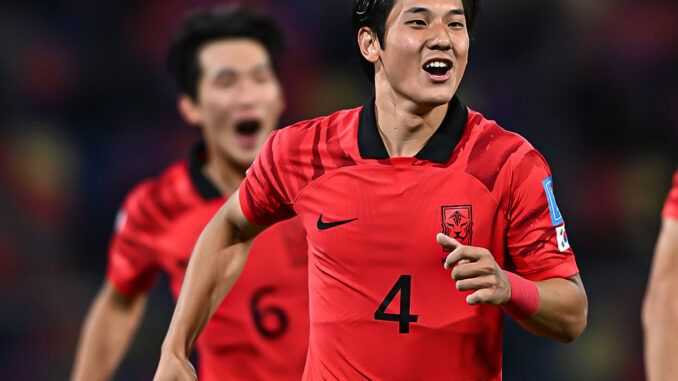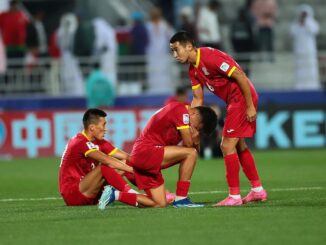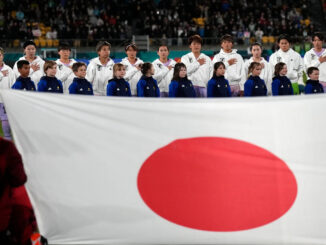
For a third FIFA U20 World Cup in a row, South Korea has led the Asian charge in youth football.
While they couldn’t replicate their run to the final from 2019, their safe passage through to the semi-finals was Asia’s best in Argentina; regrettably a tournament that probably won’t live too long in the memory.
Whether you stayed up late, or set your alarm for an early morning wakeup call, the quality of football on offer probably didn’t reward you for the sleep that you sacrificed.
As we witnessed in Uzbekistan three months ago at the AFC U20 Asian Cup, the four Asian sides who qualified deployed a broadly conservative setup; a cautious, counter attacking approach that offered little of the excitement and adventure many would have hoped for.
In truth, the U20 World Cup as a whole is starting to lose the charm it once had.
With global accessibility now at the level where you can watch and analyse any league you want, at any given point, and with scouting starting much earlier in a player’s career, the cyclical buzz around finding the next hidden gem at tournaments such as these may start to be consigned to the history books.
The fact club football has already unearthed much of the world’s next generation was spelt out in the restricted squad selection on the run up to the tournament.
France had to pick a second or even third string selection, having been rebuffed by clubs keen on keeping their up-and-coming talents under wraps and out of the spotlight. It wasn’t just the world’s elite that felt the impact, the last-minute refusal from Manchester United to release Iraqi playmaker Zidane Iqbal was a significant blow to his side’s tournament hopes.
Admittedly scheduling didn’t aid their cause – the tournament falling in the dying embers of the European league season – but neither was some of the organisation on the ground, even with the added mitigation of a last-minute switch in hosting to the other side of the world.
The pitches offered up were woefully substandard; at best patchy, at worst uneven and, weather depending, occasionally sodden.
The ongoing difficulties with demonstrating consistent interpretation of officiating decisions, or when and how to use video technology, was another recurring nightmare reminiscent of FIFA youth tournaments of the last decade.
Past that, the question that regularly arrives at this point, was once again poised. Are these tournaments designed around development, either on an individual basis or in terms of team philosophy, or on sporting merit and prestige?
The fact every nation in Argentina had a different definition of what success looked like added to an at times disjointed looking tournament.
But in South Korea, Asia have probably found the best balance between those factors, managing back-to-back runs to the latter stages of the tournament, the first Asian nation to do so.
An opening round “shock” victory over the aforementioned, understrength French was the team’s first win against European opposition in 20 years at this level. But the fact it was achieved in broadly reactive circumstances gave a hint as to what this team would become known for.
A difficult 2-2 draw against Honduras, which required a second half comeback was followed by a dead rubber draw with Gambia that ensured progression for both to the knockouts. Their stumble through to the semis, with an extra time winner over Nigeria with their first shot on target, added to the narrative of grinding progress over comfortable domination.
Between matches, there was time to get excited in the potential this group actually has, if given a little freedom.
Their thrilling 3-2 victory over Ecuador in the Round of 16 was arguably the best match of the tournament, a moment in time amongst mediocrity that actually replicated the sort of relentless match play that could have been seen in senior football. Alas, it was a fleeting look at what could’ve been.
Their eventual exit at the hands of Italy did force the Koreans out of their deep block comfort zone as the match ebbed towards it’s climax, which again allowed their promising technical talent to come to the fore, however it wasn’t enough for a second successive passage to the U20 World Cup final.
From an individual perspective, the likes of Kim Yong-hak, Lee Seung-won and Bae Jun-ho built on their reputations from earlier in the year, in offering brief moments of attacking joy, while the real standout aspect of this Korean side was the defensive trio of centre back pairing Kim Ji-soo and Choi Seok-hyun, and their keeper Kim Jun-hong.
While Kim Ji-soo has already attracted admirers from Europe, it’s to be seen whether the others can follow in his footsteps. But in potential terms, South Korea look in a good place defensively heading into the next generation.
Korea were joined in the knockout stages by U20 Asian champions Uzbekistan, who narrowly failed to make it three from three quarter-final appearances at this level with a late defeat to Israel in the Round of 16.
As we previewed heading into the tournament, this isn’t the best set of Uzbek youth players we’ve seen over the last decade, however they did illustrate an improvement in tactical organisation and solidity along their spine.
Their campaign ultimately hit its peak on opening night, narrowly missing out to the hosts on day one, having equally benefitted and lost out to narrow VAR calls.
In terms of exposure, however, there was plenty to take away from the encounter.
The likes of Abbosbek Fayzullaev and Umarali Rahmonaliev rose to the occasion in the global spotlight against peers on the books of Inter Milan, Manchester City and Juventus, while wider recognition for Central Asian football started to flood in after a mature and combative display against the reigning senior world champions.
From there on, however, they retreated to their expected level. A late comeback against New Zealand salvaged a frustrating draw, while Honduras offered meagre opposition in their final group match to seek progression – neither were approached with any certain effectiveness.
In the knockouts, despite a committed rear-guard display, most notably from their star of the tournament, centre back and recent senior call up Abdokodir Khusanov, Israel finally broke down the back door in stoppage time. A cruel, late defeat on paper, had in truth been a long time coming.
They weren’t the only team to be eliminated by a stoppage time Israeli goal either, as Japan limply let slip a 1-0 lead and extra man advantage in the final 15 minutes, to lose 2-1 and fall out of contention for the knockout phase. While halted at the last second, regrettably their delivery to that point hadn’t suggested any merit in progressing.
While their opening day win against a threatening Senegal side provided hope that, if a ropey performance could acquire results (the sign of champions they say…), then what could they achieve when they finally hit their groove? Yet, no such bounce back occurred, losing comfortably to Colombia and then Israel in their follow up encounters.
At no time over the course of the group did Japan look in control. A team of individuals fighting against a tactical setup that disregarded any sense of steady build up play, in favour of direct football and deep defending, in the hope of mere miracles at the other end of the field.
Koichi Togashi was left franticly, and at times comically, fiddling with his magnetic tactics board on the side-lines, without any real connection to his key players on the pitch.
It helps when you have the likes of Kuryu Matsuki, equally capable of the brilliant – as illustrated by his stunning opener against Senegal – but also the frustrating, with a third successive penalty miss in underage tournaments, now having missed spot kicks at the U23 Asian Cup, the U20 Asian Cup and now the U20 World Cup.
We saw similar individual promise from midfielder Taichi Fukui and defender Kota Takai, albeit frustratingly played out of position, but with no tactical structure to be seen, moments of ambition were fleeting.
In stark contrast, Iraq offered the most intriguing prospect for Asia, playing with emotion, positivity but regrettably a sense of naivety, racing towards elimination after two matches, having not scored a goal during their time in Argentina.
Responding from a sloppy opener, where they were ruthlessly picked apart by eventual finalists, Uruguay, their fate was sealed against Tunisia, with their opponents scoring three from a total of seven shots on the break, while the Iraqis profligacy heralded a blank slate from a staggering 26 attempts on goal.
A null and void goalless draw with an already qualified England, a replica on paper at least to their famous draw against the same team 10 years ago, had nowhere near the same significance, as Iraq impishly headed home without much to smile about.
While there is hope the likes of defender Kadhim Raad and attacking conjurer Youssef Amyn did enough to raise the eyebrow of one or two European scouts or agents, the short-term consideration may only be centred on senior coach Jesus Casas ahead of the Asian Cup in six months’ time.
What this says about Asian football in a global context is difficult to ascertain. With so many mitigations and varied priorities heading into Argentina, hitting the sweet spot between suitable development opportunity and sporting success is always a hard balancing act to achieve.
The one concern which seems to have seeped out consistently was a tactical one.
Again, we see four Asian teams acceptant of sitting deep in the hope of catching their opponents on the counter. While there were clearly individual talents that could threaten, coaching setups hindered their progress, with eventual semi-finalists Korea benefiting more from pragmatism than sheer talent and positivity.
Moving forward, Asia needs to be braver and more positive – as shown albeit too infrequently at the senior World Cup – if the continent’s football has any ambition of bridging the gap with the rest of the world.
Photo: The KFA
Listen to the latest episode of The Asian Game Podcast



 Korea Republic are on the hunt for redemption at this
Korea Republic are on the hunt for redemption at this  La alegría de Abbosbek Fayzullaev, figura de Uzbekistán, de tener a su familia presente en la
La alegría de Abbosbek Fayzullaev, figura de Uzbekistán, de tener a su familia presente en la 
 (@fifaworldcup_es)
(@fifaworldcup_es) 



